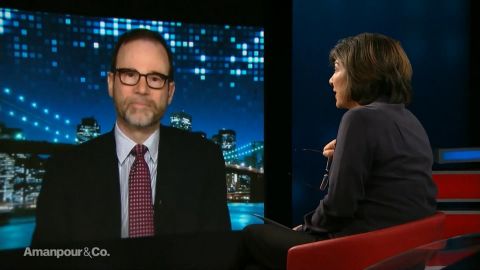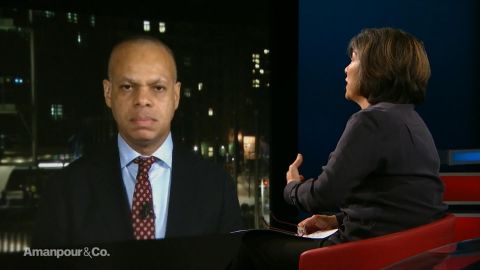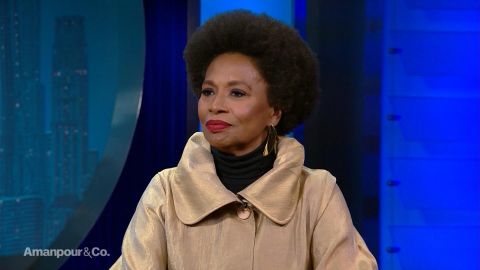Read Transcript EXPAND
CHRISTIANE AMANPOUR: After 40 years on stage and screen, the actress and singer Jenifer Lewis has proven that she isn’t afraid to make a statement. Fame for playing roles in hit movies that portray African-American life, her career has now reached new heights thanks to her role in the sitcom Blackish. And for Lewis, it was the perfect time to put her life down on paper in her memoir, The Mother of Black Hollywood, and that is just out in paperback which gave our Michel Martin just the right opportunity to talk to her. And as you’ll see, Lewis doesn’t hold back.
(BEGIN VIDEO TAPE)
MICHEL MARTIN: Jenifer Lewis, thank you so much for being with us.
JENIFER LEWIS, ACTRESS AND WRITER: My pleasure.
MARTIN: I don’t know if I should call you Mama Odie or Lana Hawkins from Strong Medicine, but I think a lot of people know you now from your role as Ruby Johnson on the hit show Blackish. So let’s see a little bit of your work.
(BEGIN VIDEO CLIP)
RUDY JOHNSON: Okay. Everybody lies, Bill Clinton, Zach Efron, and don’t get me started on Oprah. Lose weight eating bread, my ass. Even Archbishop Desmond Tutu lied. I was sitting on an airplane with him one time, went to the bathroom, came back, my peanuts were gone.
(END VIDEO CLIP)
MARTIN: So how much of your character is the writers and how much is it Jenifer with a little watered down?
LEWIS: They let me play. That’s why they hired me, they know that I’m spontaneous on set. And Ruby, I have so much fun with. But I always honor the writers. The writers are the stars of Blackish. When I get those scripts, I laugh out loud in my own house, and I don’t laugh at nobody but myself.
MARTIN: (Inaudible)
LEWIS: But the scripts – I’m telling you, but they’re so important.
MARTIN: Well, tell me what you like about Ruby as a character.
LEWIS: Well, Ruby is opinionated. She’s –
MARTIN: No, you think?
LEWIS: But she’s a whole woman also. She – you know, she’s religious – you know, a hypocrite, but she’s religious. She’s a got mess. The only thing that Ruby and Jenifer Lewis have in coming is we both love children. But Ruby is her own and – well, I guess I should admit that Jenifer Lewis has a little sass. A little.
MARTIN: A little. A little, you think?
LEWIS: But I love playing her. I love it (ph).
MARTIN: She’s unapologetically black.
LEWIS: Yes, she is, and so am I.
MARTIN: And I was wondering where that came from. Was that always the case for you?
LEWIS: That comes from getting up. That comes from feeling your feelings because Ruby’s got a big heart just like me. Feel those feelings, be scared, but get up. Get up and be unafraid. See, there’s a difference. Be scared. Snatch that weed out. It’s going to come back, but if you go down to the root you can clear it out.
MARTIN: Tell me about the roots though. You’re from Missouri –
LEWIS: The root is the pain.
MARTIN: But, no, no, no. Tell me where you’re from. Like you’re from –
LEWIS: Oh, where I’m from!
MARTIN: – like Missouri and yes.
LEWIS: Oh, that’s painful, too.
MARTIN: Yes.
LEWIS: No. I was born in a small town called Kinloch on the outskirts of St. Louis. The planes at Lambert Field used to damn near land on a house, but Kinloch sits on the border of Ferguson, Missouri. And even as a child I was warned never to go to Ferguson alone. But Ferguson had a movie theater and Kinloch did not. And I didn’t care anything about racism. I had a dream, so I would sneak out of the house. My mother would have killed me if she’d known I’d gone to Ferguson because there was so much racism there. And – but I would sneak up to the top of the balcony, get my little popcorn and imagine myself on the silver screen. And now 68 movies later, hello.
MARTIN: Did you always know that Jenifer was going to be somebody.
LEWIS: Always.
MARTIN: How did you know? What made you know?
LEWIS: Well, I sang my first solo in church at 5-years-old and from the reaction of the congregation. I stood there with my thumb in my mouth cross-eyed, but I thought to myself, “this is life,” and I never looked back.
MARTIN: So how did you get from Kinloch to become the mother of Black Hollywood?
LEWIS: I knew there was something bigger than Kinloch. I knew I had to get out. Television gave me that out. I watched television. Betty Davis, Joan Crawford, Pearl Bailey. I mean, I stayed in the Late Late Show it was called right before television went off, remember, at night? Well, I went from that small town to, of course, in high school I discovered I was an alpha female. I became president of my class, captain of the cheerleading squad. I started to nurture that gift of leadership during that time. And then I went onto Webster University, majored in theater arts, got my B.A., and honey, went to New York the day after graduation, got my first Broadway show – Eubie Blakes Musical – Musical Review – within 11 days of graduating from college.
MARTIN: I was just floored by that, and you –
LEWIS: I had no fear.
MARTIN: You had no fear.
LEWIS: No fear. I have bipolar disorder. Of course, back then they didn’t know what it was. So I have this mania that fed the dream. See, there was a positive side to it also. I was certainly depressed at night, but in the day I got up, I went to acting class, voice lessons, dance classes – anything to improve myself as an artist to conquer the dream.
MARTIN: You know that thing, you just slipped in that bipolar disorder in there, and I just want to spend a little but of time on that because –
LEWIS: Surely.
MARTIN: – in your memoir, you’re really open about your challenge of having bipolar disorder, and I was so curious about that as an artist because on the one hand you really own your extraness. I mean, you talk about that how could you (ph) always extra. But when it came time for you to sort of say, “this is something that I need to struggle with, I need to face as its own sort of thing,” I was just curious about that. Was there a part of you that was afraid to think, “maybe that’s my secret sauce,”?
LEWIS: Here in New York in my 20s when I was this Broadway star, I knew something was wrong. I didn’t know what. I figured everybody had a man in every port. I had a sex addiction. I didn’t know that. At some point, that mania will take control, and that kind of living is dangerous. Everything is excessive, impulsive, dangerous once again. You speed in a car, you drink too much, you sleep too much. I’ll tell you the depression – I said this to a journalist the other day – I might have been under those covers in the dark, but I never closed the curtains. There was always a light that came in because I wanted to be well. Oh yes, darling.
MARTIN: Was it a moment? Was it a person? What was it –
LEWIS: I wanted –
MARTIN: – that made you say, “this is time for me to stop this and face it,”?
LEWIS: I wanted on my face what I put on everybody else’s. I would leave a room and everybody’s laughing and smiling and I’d go home and that darkness. Oh, that darkness. That dark, dark place. I wanted to be happy. And so, when I got to L.A. and that theater stuff didn’t play in front of a camera where you had to know who you were in order to create enough character, hello. And I had been taught to hit the back row. That’s why the voice is so wonderful. So when I got to L.A. with that camera, you got to tell the truth, the whole truth, and nothing but the truth because people will see through you, but I didn’t know who I was. Well, I finally had a nervous breakdown from all the reckless behavior.
MARTIN: But it was years before that happened, though. I mean, you had been successful for quite some time.
LEWIS: I was successful before going to therapy because of the dream, because of the passion. Look, I’m not going to lie to you. I wanted to be a star. I wanted attention from my mother. After that solo in church I wanted that every day because of the mania.
MARTIN: But some of the artists – you know, a number of celebrities and entertainers have come forward recently.
LEWIS: Oh, yes.
MARTIN: We don’t need to call them out, but –
LEWIS: Yes, but no. I’m proud of all of them.
MARTIN: – but – but some of them feel that that mania is part of what makes them who they are.
LEWIS: Of course it is. Before I was medicated for bipolar disorder, I was concerned that the medication would take my edge. Oh, honey, I looked at my shrink. I said, “are you insane? I’m Jenifer Lewis. You’re not going to put me on lithium and have me – what, are you insane?” That’s not what it was about. It was about finding or having the patience for you dosage. We’re all different as leaves on a tree, grains of sand. Come on. We’re different. You’ve got to be patient if you want to be well. We –
MARTIN: So you’re hearing from people who have really responded to the – yes.
LEWIS: Oh, Michel, yes. People come up to me all the time.
MARTIN: Is it mainly black folks who come up to you or is it –
LEWIS: No, are you kidding? Since Blackish, honey, I’ve crossed over. I mean, the little sweet white kids came running up to me at the gate at LAX and they wanted an autograph. I thought it was so sweet, but no. You know, when I didn’t want to be recognized I would walk down the street. If I saw black people coming, because I’m in every black movie ever made, I would just lower my head so as not to get so much attention, but now –
MARTIN: Wait, wait, wait, wait. I’m trying to process you trying not to get – OK, but go ahead. Go ahead.
LEWIS: I’d try not to walk around like I’m famous. I really do. It’s so much now.
MARTIN: OK.
LEWIS: I do. I hide a little bit. Come on, I got a little sweet part. (inaudible) and demure. Girl, please. Never been, but listen. I never take it for granted. My soul explodes when people tell me they’ve read my book. I laid my burden down, and that’s why I am so happy and free. I stayed 17 years on that sofa, baby. I stayed in there because I had to be re-raised. I’m the baby of seven children. My mother (inaudible) me. She was 26-years-old when she had me. When I’d come in her room, she’d be like, “go tell your sister.” And I understand that she was cleaning white people’s floors, working three, four jobs trying to feed us as a single mother. Can you imagine having seven children at 26? What she was doing for Christ sake, but –
MARTIN: (Inaudible)
LEWIS: – I tell you one thing, honey. She educated all of us.
MARTIN: I was going to say, seven kids –
LEWIS: My mother, honey, we all have masters and doctorates. My mother say, “you will be educate
LEWIS: My mother, honey, we all have masters and doctorates. My mother said, you will be educated, and we are. I have two siblings that taught in the St. Louis school district for 30 years, they’re retired now. One is a big shot at state forum and the other is a big shot at AT&T. My mother did not play. She got off welfare and she got — she went in and became a nurse’s aide at St. Louis County (ph) Hospital for 25 years. My mother was a wonderful woman. She was hard. She didn’t play. Her name is the first three words in my book, Dorothy Mae Lewis, and I loved her, and I made peace with her. I was molested by the pastor of my church, whom she was in love with. Oh, dear god.
MARTIN: You can hold two thoughts in your head at the same time, though. I mean, you can love her and forgive her and still recognize your pain
LEWIS: Oh, sweetie, I made peace with my mama. Oh, I made peace with my mama. Because I told her and she didn’t know what to do with it.
MARTIN: I just wanted to mention that you’ve had a couple statements that have gone viral recently. You wore Kaepernick’s jersey to the Emmy’s and then you recently had a YouTube video, a get out the vote video in advance of the midterms, it got a lot of attention.
(BEGIN VIDEO CLIP)
LEWIS: I don’t care who you are or where you work, get your ass out and vote. This ain’t the election to sit home and lurk. Get your ass out and
vote.
(END VIDEO CLIP)
MARTIN: How do you decide what it is you’re going to do?
LEWIS: I do things for my soul. I’m so aligned right now. Make no mistake, there’s nothing perfect about any of us. And I got my (inaudible), but I stay aligned. And when they shot into that synagogue and my girlfriend called me that morning, I’d had enough. I sobbed like a baby. I got up and I fed my soul on what to do, what to do with this sadness and this horror, this thing that the leader of the free world allows and promotes, this violence, where the NRA has done nothing about gun control, and they shot white babies at Sandy Hook. Well if they don’t care about their own babies, what are they going to care about? So, see, we — we — and when I say we, I’m saying we, the people. I’m not just talking about African-Americans. Who are we to say that one race is in this? We all bleed red. Come together is what I say.
MARTIN: It comes to you as an inspiration like your song, get out and vote.
LEWIS: Absolutely. I came home and sat right down at the piano and I said, that’s enough. Everybody check your soul at the Super Bowl. That’s enough. Blacks, whites, Jews, we’ve got to refuse. If our ancestors took two knees in the cotton field, you can take one. All of you players can go down at the same time. They can’t fire you all. What’s wrong with you? Stand up because you are the gladiators of our time. But will I go at it alone? Will I go and sit on the wall when they build it? Will I march 50 million down there with me? I most certainly will.
MARTIN: So what’s next for Jenifer Lewis?
LEWIS: So what’s next? Let me live in my joy. Let me do what I can for my family, my friends, my country. And everybody that lives in it. I care. People ask why I give so much. Because I care. I care that my great-grandchildren have air to breathe. I’ve been to Alaska and seen the melting of the glaciers with my own eyes. I went to Flint. I saw the dirty water with my own eyes. I went down to Parkland and talked to the children. This is not just a book tour. I don’t need any money. But I’m in the trenches while touring with this book.
MARTIN: Jenifer Lewis, thank you for talking with us.
LEWIS: Thank you, you’re wonderful. I loved your questions. Thank you.
About This Episode EXPAND
Christiane Amanpour speaks with Victor Cha, former member of the U.S. National Security Council; Patrick Gaspard, President of the Open Society Foundations; and Stephen Adler, President and Editor-in-Chief at Reuters. Michel Martin speaks with actress Jenifer Lewis.
LEARN MORE



